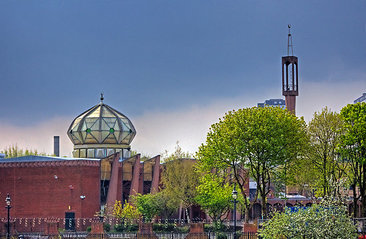
Some of our time was spent reflecting on the Marakesh Declaration. This came out of a convention called by the King Mohammed VI of Morocco in January and attended by 250 of the world's most eminent Islamic leaders from over 120 countries with observers from other faiths. One of the organising partners was the Forum for Promoting Peace in Muslim Societies based in Abu Dhabi, an organisation I had never heard of before but worth knowing about, I think. The convention celebrated the 1400th anniversary of the Charter of Medina written by the Prophet Mohammed when he set up the Muslim state in Medina after his flight from Mecca. It establishes a rule of law for a pluralistic society and offers freedom of religion, especially to the Jews living in Medina at the time. The Marakesh statement focusses on the place of minorities in Islamic societies. It calls for the protection of the rights and liberties of all religious groups and asks "Muslim educational institutions and authorities to develop a jurisprudence of the concept of citizenship which is inclusive of diverse groups".
But I can't help wondering if it's possible to truly feel a citizen while being described as a minority. Immediately this throws up a them and us situation. While this declaration refers to Muslim majority societies it could easily have been written in Britain a number of years ago when we talked about ethnic minorities and later minority ethnic communities. I don't think I truly appreciated at the time that this was alienating and marginalising for people, especially if their families had lived in this country for two or three generations. This notion, wishing to be inclusive as it does, seems to be based on the model of civic life which Lord Jonathan Sacks calls the Country House model. The image of the country house conjures up a society which wants to welcome others into it, even wants them to feel at home but only on the terms set down by the majority who establish the rules, conduct, way of life and the others are expected to conform. They are always guests in someone else's home, never truly at ease, keeping their own customs and way of life private. Lord Sacks suggests this was the model prevalent in Britain from the middle of the last century especially after a large influx of immigrants in the 1950s. He suggests it then developed into the model of the Hotel. Here there was a recognition of a shared home but, as guests in a hotel keep to their own rooms, perhaps passing in the corridors or even sharing a table in the dining room, so different communities lived quite separately from one another - perhaps meeting now and then at events or whatever but then retiring back into their own community lives. This is the kind of multi-culturalism that Trevor Philips said was a failure and it may well be that we have not developed much beyond this model. What the former Chief Rabbi is suggesting in his book ' A Home We Build Together' is that society needs to become a place of engagement and inclusivity where we all, no matter what our ethnic origins or religions, can feel involved in a common enterprise of building a better society for us all.
My sense is that this is done better in a secular society than a religious one. I wonder if a secular society is the best and maybe the only way to guarantee the kind of equality that motivates us to have concern for the common good. Is this possible in a society where one religion and its way of life dominates the public square? It could be of course that a secular society is not much better especially if it promotes an atheistic and totalitarian philosophy. We have plenty of examples of non-religious societies which were in fact anti-religious, oppressive and violent. These regimes did not support equality, equal participation or a sense of common citizenship. My understanding of a secular society is the one set out in a Scottish Government document ' Belief in Dialogue'. There it states quite clearly that modern Scottish society is secular which means that it's about creating a society of equals regardless of the beliefs of those within it; allows freedom to practice religious beliefs openly; allows for engagement in civic processes with the possibility of influencing political decisions. And what the state sees to do is " to provide ‘a space in the public square’ to a wide range of views to ensure the freedom of many religious groups and not just one or even none". This is a vision of a society which respects equality and inclusiveness because it recognises that all its citizens share a common humanity and that they all have the right to their own beliefs and values which should be respected as part of the diversity of Scotland.
The Marrakesh Declaration is an important statement and should be publicised well. Hopefully though it's the beginning of a conversation about shared citizenship and about the kind of society in which all feel valued for themselves and enjoy equality of status and freedom of worship. It's good to know that these questions are being raised throughout the world and surely, if enough of us engage in the conversation, it must take the human family further on its journey towards acceptance and respect for unity in diversity


 RSS Feed
RSS Feed
